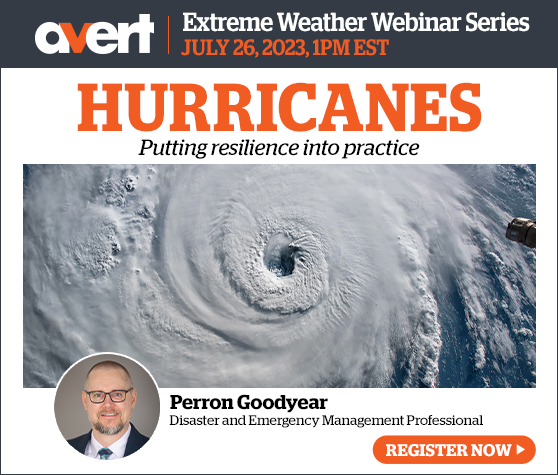
Community support and lessons learned: A recap of ‘Hurricanes’ webinar with Perron Goodyear
July 31, 2023
By
Haley Nagasaki
Avert presents the first of the Extreme Weather Webinar Series, Hurricanes, with EM and Avert editorial advisory board member Perron Goodyear

Last week, disaster and emergency management professional Perron Goodyear joined Avert for an interactive webinar on the topic of Hurricanes from the Extreme Weather Webinar Series.
The EM professional of nearly 20 years hails from his home province of Newfoundland and Labrador and calls himself a “pracademic,” honing his skills in the field as both a practitioner and academic. Goodyear uses boots-on-the-ground experience from nine North American hurricane weather events to inform case studies, after-action reports, and lessons learned to assist new and leading professionals navigate the aftermath of severe coastal hurricanes.
Goodyear began the webinar with a case study discussing his experience on the ground following Hurricane Fiona. Some challenges during the response were recognized, such as difficulty obtaining accurate situational awareness as sources provided conflicting information. This made it difficult to assess the extent of the damage and delayed EM response efforts.
He also addressed the importance of local resources and community support during Fiona response. In some areas, access to outside help was limited, and communities had to rely on their own resources initially. Strong relationship building within the community triumphed, benefiting those who asked for help when needed.
Goodyear advises against seeing asking for help as a sign of weakness, but rather as a “self-awareness of when assistance is necessary.”
Another crucial point Goodyear made during his presentation is that emergencies “are not the time for exchanging business cards.” This means that emergency management professionals need to be proactive in relationship-building and establish connections with local resources before a crisis occurs.
Outside-the-box thinking and reaching out to non-traditional sources of support and assistance can make a big difference down the line. Goodyear stressed the importance of knowing what resources are available locally and having a plan in place for accessing and utilizing them effectively rather than depending on mutual aid and resources beyond the reach of the community in crisis. During hurricanes, this is generally true in relation to power outages and access to supplies explained Goodyear.
Across the board, the EM professional also cautioned that the lack of overall co-ordination during emergencies may result in fragmented response as different groups and organizations work independently. Therefore, the need for better co-ordination and communication between teams can help facilitate clear and efficient response, including conducting after-action reports.
Another key takeaway from the event is the importance of learning from past experiences. Goodyear stated that simply documenting lessons observed is not enough; “actual change must occur for the lessons to be learned.”
He emphasized the need to develop after-action reports while the experience is still fresh, even if it may be uncomfortable to confront tactical errors. After-action reports should not only record lessons learned but also outline a plan for future success while ensuring that the knowledge is passed on to future emergency management professionals and volunteers.
In terms of resource management, Goodyear highlighted the importance of effective utilization of available resources. He emphasized that resources extend beyond physical equipment and supplies to include personnel and expertise. During hurricane response, it is crucial to maximize the skills and knowledge of the team and utilize them strategically, such as delegating tasks to individuals with certain expertise, seeking assistance from outside professionals when necessary, and establishing a demobilization plan.
Circumstances can change rapidly during severe weather events and it is essential to be able to adjust plans and strategies accordingly, making adaptability an essential component of response. Goodyear encourages emergency management professionals to embrace a growth mindset and be open to new ideas and approaches.
The importance of accurate situational awareness, community support, co-ordination, learning from past experiences, and resource utilization was hit home throughout the presentation.
Goodyear’s practical advice on after-action reports and succession planning offers guidance for organizations seeking to improve their emergency management practices. The webinar ultimately emphasized the need for proactive preparedness and a collaborative approach to effectively respond to hurricanes and other disasters.
Click here to view a replay of “Extreme Weather Webinar Series: Hurricanes,” hosted by Avert.
Print this page